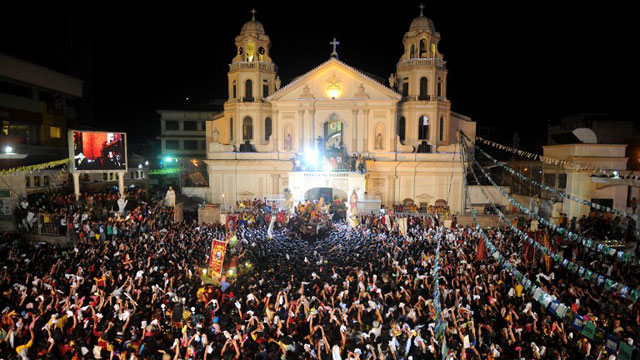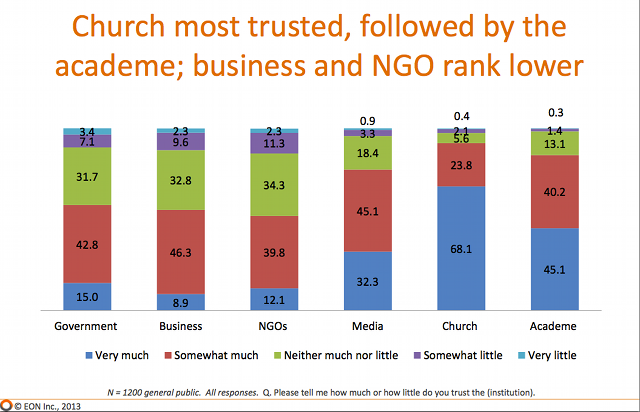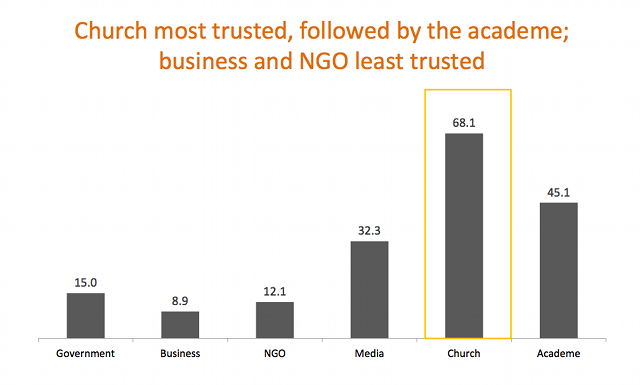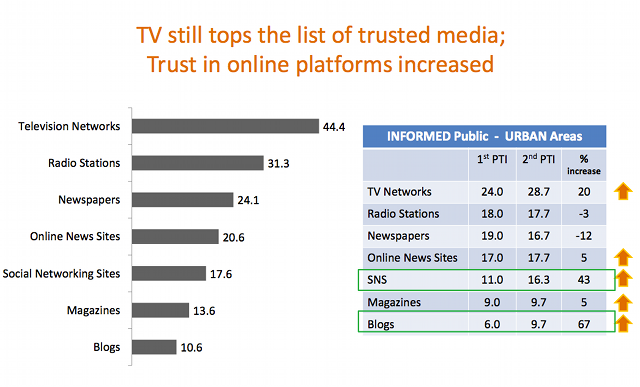SUMMARY
This is AI generated summarization, which may have errors. For context, always refer to the full article.

MANILA, Philippines – A 2012 survey shows that Filipinos trust the Church more than they trust government. More Filipinos also trust the academe (45.1%) and the media (32.2%).
According to the 2nd Philippine Trust Index, a majority of 68.1% of Filipinos trust the Church. Only 15% trust the government.
Yet the government’s latest trust ratings is already a huge improvement from the 2011 survey, when only 7% of Filipinos said they trusted the government. Trust in government departments also increased across the board, according to the survey.

In the latest survey, 21.8% of the respondents said the Church must “maintain its separation from the state.” They also look up to the Church for spiritual guidance (32.8%) and for it to be a role model of holiness (28.6%).
At least 12% of the respondents said they trust nongovernment institutions, while 8.9% trust business.
The Philippine Trust Index is a study on trust among the different stakeholders in the Philippines — government, church, NGOs, business, and media. The survey was conducted by EON Stakeholder Relations in partnership with the Ateneo Graduate School of Business (AGSB).
General vs informed public

The survey had 1,575 respondents covering the general public (those who have educational attainment below 2nd year college) and informed public (2nd year college and above).
The survey noted the trust gap between the informed public and the general public. It is most pronounced in the ratings of the Church. Among the informed public, 56.3% said they trust the Church. Among the general public, 68.15% said they trust the Church.
There’s also a difference between informed public from urban areas and informed public from rural areas. Church-state separation was a most important issue for the informed public in urban areas (52.7%). For the informed public in rural areas, only 25.3% considered church-state separation important.
This issue is important to the general public in urban areas (27.5%) and general public in rural areas (16%).
Trust in the media

There’s also significant difference between the informed public and the general public when it comes to the trust ratings of the media. Among the informed public, 24.8% said they trust the media. Among the general public, 32.3% said they trust the media.
Traditional media still enjoy the highest trust, but trust for online media increased. Television networks had a trust rating of 44.4%, radio had 31.3% and newspapers had 24.1%.
Online news sites got a trust rating of 20.6%. Social networking sites got a trust rating of 17.6%. Blogs got 10.6% trust rating.
“Trust in Media was largely driven by being truthful (72.6%). Adherence to fairness came in a distant second (21.1%),” according to the survey press release.
Office of the President
EON noted the big jumps in trust levels for the informed public in urban areas for the different government agencies. The Office of the President improved its trust rating from 9.4% in 2011 to 21% in 2012.
The Cabinet also improved its rating from 4.4% to 14%. Improvements were also noted in local government units, Supreme Court, Senate, House of Representatives, and regional trial courts.
For the government, the top quality that the public is looking for is “corruption-free.” The public also looks for qualities such as pro-poor, able to fulfill campaign promises, and able to generate jobs.
“The findings show us that establishing trust is a dynamic process that all institutions need to pay close attention to – and we have seen in that in 2012 trust levels increased for the government, media and the church. This highlights the important role of communication and engagement among all organizations, whether they are building their brand, enhancing shareholder value, or rebuilding their reputation,” said Junie del Mundo, Chairman and CEO of EON.
AGSB Dean Albert Buenviaje added: “The findings are instructive and will guide us in better understanding the way Filipinos think and establish trust, whether for an individual or an institution. For the Ateneo Graduate School of Business, the PTI highlights trust as an important ingredient in shaping effective leaders in the Philippines.” – Rappler.com
Add a comment
How does this make you feel?
There are no comments yet. Add your comment to start the conversation.